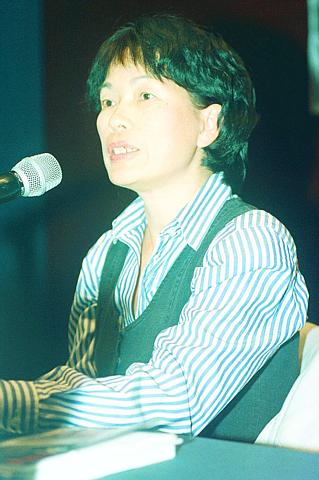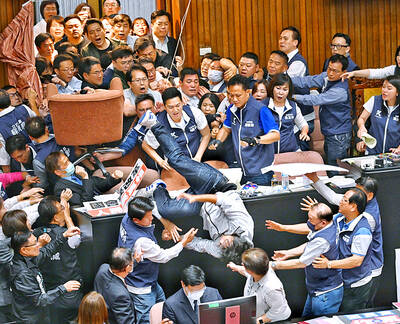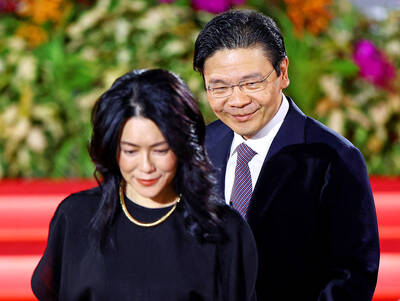At a media gathering to launch her new book yesterday, Lung Ying-tai (龍應台) said transforming herself from a writer and social critic to director of the Taipei City Government's new Bureau of Culture was no small task, but she hopes her undertakings will influence the Chinese-language community worldwide.
Lung, who calls her absence from from Taiwan since 1987 "exile," returned from her base in Germany just last Thursday. Today, she takes her post as head of the culture bureau, now under the auspices of a preparatory committee.
One day before her new assignment, however, Lung said she wanted to retain her role as a writer and interact with her readers.

PHOTO: DAI LI-AN, LIBERTY TIMES
But the occasion yesterday perhaps gave her a taste of the future. Although she prefers to think of herself as an expert in "avoiding cameras and reporters," she was welcomed by just that -- a roomful of journalists -- together with her "readers."
"Sitting here, I have already started to adapt myself to my new role," Lung said.
"As a writer, I try to avoid TV coverage as much as I can because I am afraid of being recognized when I walk down the street. But as the director of the Bureau of Culture, I cannot do this. I have to articulate my concepts through the media so as to make myself understood," said Lung.
One of her colleagues offered her some words of caution at yesterday's event. Writer Yang Chao (楊照), who was invited to speak to the audience with Lung about her new book, warned of a "transformation" after taking her new post.
"Maybe three and a half years from now, she will be like [early 20th century writer and social critic] Lu Xun (
Lung, renowned for her sharp observations on social phenomena as well as her idealism, returned his comments with a smile.
"Perhaps from tomorrow [meaning today], I'll start attending the `cram school on darkness' ... In history, although idealistic, passionate people have ended up frustrated, I still appreciate a sort of human glory [in these precedents]; it's something I am willing to pursue," she said.
"Taipei nowadays sits at the center of the Chinese-language community worldwide, not at its margin. If the cultural projects in the city go well [after I lead the bureau], then my influence on the Chinese-language community will no longer be through my writings but through other means," she said.
Meanwhile, Lung said even her readers in China have shown concerns over the fact that a KMT-run city government is willing to recruit a writer like her -- someone famous for her criticism of the KMT -- as a civil servant.
The city's plan to establish the bureau had been aborted by partisan disputes in the city council under former mayor Chen Shui-bian (
The dispute was finally settled when Mayor Ma Ying-jeou (馬英九) beat Chen last December. The council decision passed a resolution to establish the bureau in July.
The bureau, which will begin operations in November, will be Taiwan's first cultural bureau at the local government level.

MUSICAL INTERLUDE: During the altercations, KMT Legislator Hsu Chiao-hsin at one point pulled out a flute and started to play the national anthem A massive brawl erupted between governing and opposition lawmakers in the main chamber of the legislature in Taipei yesterday over legislative reforms. President-elect William Lai (賴清德) is to be inaugurated on Monday, but his Democratic Progressive Party (DPP) lost its majority in the legislature and the Chinese Nationalist Party (KMT) has been working with the Taiwan People’s Party (TPP) to promote their mutual ideas. The opposition parties said the legislative reforms would enable better oversight of the Executive Yuan, including a proposal to criminalize officials who are deemed to make false statements in the legislature. “The DPP does not want this to be

Singapore yesterday swore in Lawrence Wong (黃循財) as the city-state’s new prime minister in a ceremony broadcast live on television after Lee Hsien Loong (李顯龍) stepped down following two decades in office. Wong, formerly deputy prime minister, was inaugurated at the Istana government office shortly after 8pm to become the second person outside the Lee family to lead the nation. “I ... do solemnly swear that I will at all times faithfully discharge my duties as prime minister according to law, and to the best of my knowledge and ability, without fear or favor, affection or ill-will. So help me God,” the

BASIC OPERATIONS: About half a dozen navy ships from both countries took part in the days-long exercise based on the Code for Unplanned Encounters at Sea An unpublicized joint military exercise between Taiwan and the US in the Pacific Ocean last month was carried out in accordance with an international code, the Ministry of National Defense (MND) said yesterday. According to a Reuters report citing four unnamed sources, the two nations’ navies last month conducted joint drills in the Western Pacific. The drills were not made public at the time, but “about half-a-dozen navy ships from both sides, including frigates and supply and support vessels, participated in the days-long exercises,” Reuters reported, citing the sources. The drills were designed to practice “basic” operations such as communications, refueling and resupplies,

‘TOO LATE’: Yu Pei-chen, a Taoyuan councilor and ex-army general, said the Chinese officials were 41 years late in imposing sanctions on him, as he enlisted in 1983 China’s Taiwan Affairs Office (TAO) yesterday announced sanctions against five Taiwanese politicians, pundits and public figures critical of Beijing, accusing them of spreading disinformation about China. The five are: Liu Bao-jie (劉寶傑), Lee Zheng-hao (李正皓), Wang Yi-chuan (王義川), Yu Pei-chen (于北辰), Huang Shih-tsung (黃世聰), TAO spokesman Chen Binhua (陳斌華) told a routine news briefing, adding that the sanctions included their families. They were responsible for making up and spreading false information about China that “deceived some Taiwanese, sowed division ... and harmed brotherly goodwill across the Strait,” Chen said. Speech is not free from the regulations of Chinese law, which punishes manufacturing incorrect